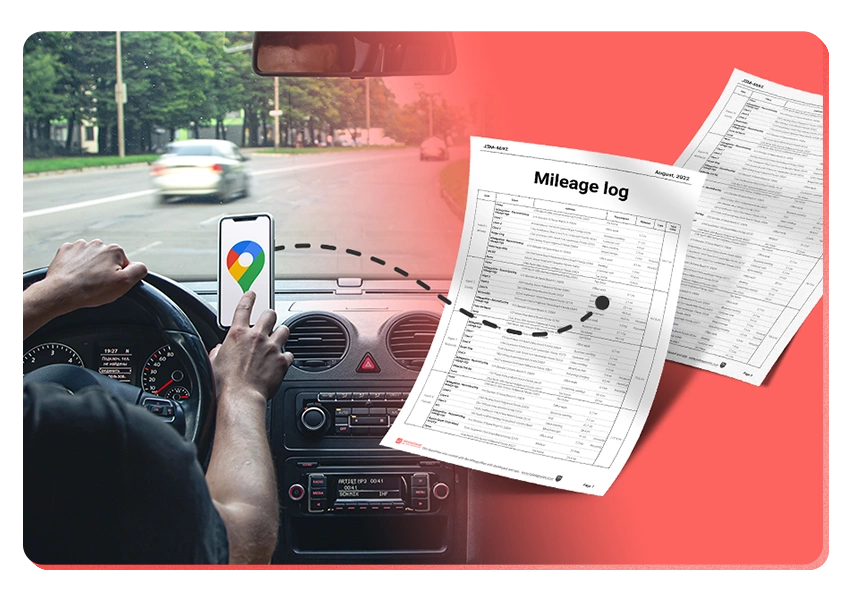For small business owners, tracking mileage can be a tedious but essential task, especially when it comes to maximizing tax deductions and controlling business expenses. The days of manually recording mileage in a paper log are fading, as digital mileage logs have made the process much more efficient, accurate, and convenient. If you’re still on the fence about switching to a digital solution, here are five major benefits of using a digital mileage log for small business owners.
1. Time-Saving and Automation
One of the most significant benefits of using a digital mileage log is the time it saves. With automation at its core, digital tools can track your trips without requiring manual input for every trip you take. Digital mileage logs leverage GPS technology to automatically track the distance traveled, categorize the trip (e.g., business or personal), and generate detailed reports.
Key Benefits:
- Automatic trip recording: No need to input start and end points or calculate the total miles driven manually. The app does all the work for you.
- Time-saving: Save hours of manual data entry and avoid human errors by automating your mileage logging process.
- Real-time tracking: Instantly track your miles and generate reports without waiting until the end of the week or month to log trips.
For small business owners, where time is money, using a digital mileage log can significantly streamline daily operations and free up more time to focus on growing the business.
2. Increased Accuracy and IRS Compliance
Maintaining an accurate mileage log is crucial for tax purposes. The IRS requires detailed, accurate records to support any mileage deductions claimed on your tax return. With a manual log, it’s easy to forget trips, make mistakes, or fail to record necessary information. A digital mileage log reduces these risks by automatically capturing all the essential details required by the IRS.
How Digital Mileage Logs Ensure Accuracy:
- GPS precision: Digital tools use GPS to track your exact route, distance, and locations, ensuring 100% accurate mileage data.
- Error reduction: Automatic tracking eliminates the risk of human error, such as miscalculating miles or missing trip details.
- IRS-compliant reports: Many apps generate reports that meet IRS standards, with all the required details like trip dates, start and end points, and the purpose of each trip.
By ensuring accuracy, a digital mileage log helps you avoid issues with the IRS and ensures you claim the full mileage deduction you’re entitled to.
3. Maximized Tax Deductions
One of the biggest financial benefits of keeping a digital mileage log is maximizing your tax deductions. Small business owners can deduct miles driven for business purposes, but only if the trips are recorded properly. A digital mileage log not only ensures your records are accurate, but it also helps you capture every deductible mile.
Benefits for Maximizing Deductions:
- Comprehensive tracking: Digital logs capture every trip, ensuring no miles are forgotten or left unrecorded.
- Categorization: Most digital logs allow you to categorize trips as business or personal, ensuring only business miles are included in your tax deduction calculations.
- Real-time updates: Track your deductible miles as you go, making it easier to maximize deductions at tax time.
Small business owners can see significant tax savings by making sure they track every business-related trip and claim the proper deductions.
4. Easy Integration with Financial Systems
Digital mileage logs can integrate with your existing financial and accounting systems, simplifying the expense tracking process. By automatically syncing your mileage data with your accounting software, you eliminate the need for manual data entry and streamline your record-keeping process.
Integration Benefits:
- Seamless data flow: Automatically export mileage data into accounting software, reducing time spent on bookkeeping and ensuring consistency in records.
- Expense tracking: Keep track of your travel-related expenses easily, ensuring that all mileage and vehicle expenses are accurately logged and reflected in your financial records.
- Simplified reporting: Generate reports on mileage and travel expenses in just a few clicks, making it easier to stay organized and prepared for tax season or audits.
For small business owners juggling multiple tasks, the ability to integrate your mileage log with your financial systems can save valuable time and help maintain clean, organized records.
5. Flexibility and Accessibility
Digital mileage logs offer unmatched flexibility and accessibility, allowing small business owners to manage their mileage data from anywhere, at any time. Whether you’re in the office or on the go, you can easily access and update your mileage records using your smartphone, tablet, or computer. Most digital mileage tracking tools also offer cloud-based storage, ensuring that your data is safe and accessible even if you switch devices.
Advantages of Flexibility:
- Mobile accessibility: Log miles and review records on the go using your mobile device, ensuring you never miss a trip.
- Cloud storage: Store your mileage data securely in the cloud, making it easy to access from any device or location.
- Sync across devices: Sync your mileage data across all your devices, ensuring you always have access to up-to-date records.
This level of flexibility allows small business owners to stay on top of their mileage tracking, no matter where their business takes them.
Conclusion
Switching to a digital mileage log offers small business owners a wealth of benefits, from saving time and improving accuracy to maximizing tax deductions and streamlining financial integration. Whether you’re looking to simplify your record-keeping, ensure IRS compliance, or get the most out of your business deductions, a digital mileage log is an invaluable tool that can help you stay organized and efficient.
By embracing digital tools like Everlance, small business owners can focus less on tracking miles and more on driving their business toward success.






